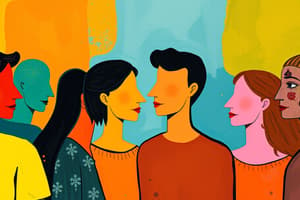Podcast
Questions and Answers
What do societal groups share?
What do societal groups share?
- Same physical appearance
- Identical religious beliefs
- Similar educational backgrounds
- Common beliefs, values, interests, and experiences (correct)
How are ethnic groups defined?
How are ethnic groups defined?
- Physical attributes and age
- Political affiliations
- Race, culture, language, and religion (correct)
- Socioeconomic status only
What is a critical aspect of promoting equity and social justice concerning gender?
What is a critical aspect of promoting equity and social justice concerning gender?
- Imposing binary gender representation
- Ignoring non-binary or transgender individuals
- Recognition of diverse gender identities (correct)
- Enforcing strict gender roles
Which age group is typically associated with the term 'seniors'?
Which age group is typically associated with the term 'seniors'?
What is a characteristic of age groups within society?
What is a characteristic of age groups within society?
How do gender groups go beyond binary representation?
How do gender groups go beyond binary representation?
What is the primary factor used to divide people into socioeconomic status groups?
What is the primary factor used to divide people into socioeconomic status groups?
Which of the following is NOT mentioned as a major religious group?
Which of the following is NOT mentioned as a major religious group?
What is the significance of understanding and respecting diverse religious practices and beliefs?
What is the significance of understanding and respecting diverse religious practices and beliefs?
Which of the following best describes political affiliation groups?
Which of the following best describes political affiliation groups?
What is the importance of embracing diverse political viewpoints in society?
What is the importance of embracing diverse political viewpoints in society?
Which of the following challenges is NOT mentioned in the text as needing to be addressed through fostering inclusive environments?
Which of the following challenges is NOT mentioned in the text as needing to be addressed through fostering inclusive environments?
Study Notes
Societal groups refer to various social entities within society who share common beliefs, values, interests, and experiences. These groups can be defined by ethnicity, gender, age, socioeconomic status, religion, political affiliations, or any other shared characteristics. This article will explore some of these societal groups and how they contribute to our diverse world.
Ethnic Groups
Ethnic groups are those based on national origin, race, culture, language, and religion. Examples include African Americans, Hispanic Americans, Asian Americans, Native Americans, Middle Eastern Americans, European Americans, etc. Each group brings unique cultural practices, beliefs, and values to society, adding richness and diversity.
Gender Groups
Gender groups are defined by biological sex (male or female) but can also include those who identify as non-binary or transgender. While gender is often seen through the lens of binary representation, there exists a spectrum that includes many other identities and experiences beyond male and female labels. The recognition of and respect for diverse gender identities are critical aspects of promoting equity and social justice.
Age Groups
Society includes various age groups such as children, teenagers, adults, middle-aged individuals, seniors, and older adults. These groups have different needs, interests, and challenges throughout their lives and should be acknowledged with appropriate support systems and services tailored to each stage.
Socioeconomic Status Groups
People are divided into socioeconomic status groups based on income, occupation, education level, wealth, and social class. There is a strong correlation between one's economic position and access to resources, opportunities, and overall quality of life. Addressing socioeconomic inequality is essential for promoting social justice and equality.
Religious Groups
Religious groups encompass individuals sharing common beliefs about deities, supernatural beings, or spiritual principles that influence their way of life. These groups include Christianity, Islam, Judaism, Hinduism, Buddhism, Confucianism, among others. Understanding and respecting diverse religious practices and beliefs is crucial in fostering interfaith dialogue and peace.
Political Affiliation Groups
Political affiliation groups consist of people who identify with different political ideologies or parties. These can range from left to right on the political spectrum, including liberal, conservative, libertarian, socialist, etc. Embracing diverse political viewpoints allows for healthy debate and decision-making within society.
In conclusion, societal groups play a vital role in shaping our communities and culture. They offer unique insights into human experiences and should be respected and valued for their distinctiveness while also recognizing the need for unity and understanding among all members of society. As we continue to face challenges such as economic inequality, systemic discrimination, and climate change, it's essential to foster inclusive environments where diversity is celebrated and everyone has equal opportunities to thrive.
Studying That Suits You
Use AI to generate personalized quizzes and flashcards to suit your learning preferences.
Description
Explore various societal groups such as ethnic, gender, age, socioeconomic status, religious, and political affiliation groups. Learn how these groups contribute to diversity, equity, and social justice in our communities and culture.




